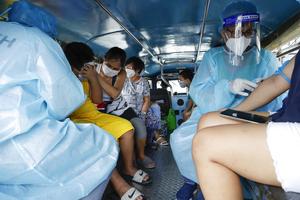 Health workers collect blood samples inside a jeepney bus at a free COVID-19 drive-thru testing facility in Manila, Philippines, July 20, 2020. (AARON FAVILA / AP)
Health workers collect blood samples inside a jeepney bus at a free COVID-19 drive-thru testing facility in Manila, Philippines, July 20, 2020. (AARON FAVILA / AP)
Much of Southeast Asia is once again stepping up control efforts against the coronavirus in the face of rising numbers of infections-even in those countries that had won praise for getting on top of the outbreak.
The region had to pay a huge price in exchange for lives saved with the lockdowns and social distancing measures
Philippine President Rodrigo Duterte reimposed strict lockdown measures in the capital Manila on Tuesday, with the country fast becoming the region's new hot spot for the virus. Health officials reported a record single-day rise of 6,352 new infections on that day, taking the country's total to more than 112,500, with 2,115 deaths.
Vietnamese authorities locked down the tourist hub of Da Nang after seeing the country's first domestically transmitted case in 100 days on July 24. That snowballed into an outbreak affecting domestic tourists. The government, which has been recognized for its effective efforts against COVID-19, plans to test Da Nang's entire population of 1.1 million people.
READ MORE: Loudspeakers teach Indian kids after virus shutters schools
Thailand, also regarded as a success story, tightened regulations on foreign visitors in mid-July following the discovery of two imported cases of the coronavirus. In Singapore, officials are continuing with stringent testing, contract tracing and quarantining after returning expats and overseas-based Singaporeans led to a spike in imported cases in July.
Dominic Meagher, a visiting fellow at the Australian National University's College of Asia and the Pacific, said Southeast Asian countries are using the same strategies employed during the first wave of infections: Restricting traveler entries, requiring people to use face masks and promoting social distancing measures.
Meagher said any country always faces the risk of another wave of COVID-19 infections, hence the importance of having a comprehensive health policy.
ALSO READ: Singapore migrant worker mental health in spotlight
He cited the experience of Vietnam, which has stood out for its speedy and decisive action against the virus. But even with the outbreak in Da Nang, Vietnam had reported only 670 cases as of Tuesday, with just eight deaths. It had gone 100 days without community transmission until the virus resurfaced in the central Vietnamese city.
Increasing numbers of cases in the harder-hit countries have strained public health systems, while the lockdowns have hurt businesses and driven up unemployment rates
Comprehensive strategy
"Vietnam has managed to control the virus incredibly well so far with a comprehensive strategy that includes border measures, general public responses like using masks, and avoiding crowds and confined spaces, and targeted isolation measures based on contact tracing and testing," Meagher said.
However, he said that while these measures "worked incredibly well, we should never expect perfection".
Rogier van Doorn, director of the Oxford University Clinical Research Unit in Hanoi, said the Vietnamese government is continuing the same measures that had helped it limit infections.
"They're taking people who have contact with an infected person out of the community," van Doorn said.
For Southeast Asia as whole, the United Nations said the region "has reported significantly lower confirmed COVID-19 cases and related deaths than most other global regions".
"While COVID-19 arrived in Southeast Asia earlier than in the rest of the globe, its governments also generally took more rapid containment actions," the UN said in a policy brief issued on July 30.
Huge cost
But the region had to pay a huge price in exchange for lives saved with the lockdowns and social distancing measures. Increasing numbers of cases in the harder-hit countries have strained public health systems, while the lockdowns have hurt businesses and driven up unemployment rates.
Economic growth in the region is expected to contract by 2.7 percent this year, the Asian Development Bank said.
Thailand and Vietnam, after enjoying several weeks without community transmissions, began promoting domestic tourism through discounts and subsidies, enabling them to revive one of the sectors hit hard by the pandemic. Cambodia, Singapore and Malaysia have opened green lanes to facilitate business travel.
Teo Yik Ying, dean of the Saw Swee Hock School of Public Health at the National University of Singapore, said the city state cannot avoid a new wave of infections given the number of returning workers, students and residents.
He said that while Singapore allows the entry of its overseas-based citizens, long-term work pass holders and foreigners on essential business travel, the country remains closed to tourists.


